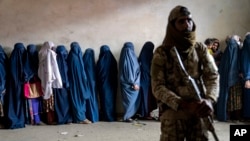The leader of Afghanistan's fundamentalist Taliban government has said it is determined to enforce the Islamic criminal justice system, including the public stoning of women for adultery.
"Our mission is to enforce sharia and Allah's Hudud [law]," said Hibatullah Akhundzada in an audio clip Taliban officials said was from his latest speech. They did not say where the reclusive leader spoke, but Akhundzada lives in the southern Afghan city of Kandahar and rarely leaves what is known as the Taliban's historical birthplace and political headquarters.
He primarily addressed Western critics of the Taliban government, which Akhundzada is effectively controlling from Kandahar, through edicts based on his strict interpretation of Islam.
"You may call it a violation of women's rights when we publicly stone or flog them for committing adultery because they conflict with your democratic principles,” said the Taliban chief.
"Just as you claim to be striving for the freedom of entire humanity, so do I. I represent Allah, and you represent Satan," Akhundzada said.
He criticized Western human rights values and women's freedoms, saying Taliban religious scholars would persistently resist the West and its form of democracy in Afghanistan. "Thanks to these scholars, such a democracy was evicted from this land," the Taliban leader said.
The Taliban returned to power in August 2021, when the then-internationally backed government collapsed, and U.S.-led Western nations withdrew all their troops after nearly 20 years of involvement in the Afghan war.
Taliban authorities have since publicly flogged hundreds of Afghans, including women, for theft, robbery, and committing "moral crimes" in sports stadiums in the presence of thousands of onlookers. At least four men have also been publicly executed after having been convicted of murder by Taliban courts.
Akhundzada has suspended girls' education in Afghanistan beyond the sixth grade and prohibited many women from public and private workplaces, including the United Nations and other aid organizations.
Women are not allowed to undertake long road and air trips unless accompanied by a male relative, and cannot visit public places, such as parks, gyms, and bathhouses.
The Taliban leader defends his governance, saying it is aligned with Afghan culture and Islam.
The new academic year started in Afghanistan last week, but girls above 12 were excluded for the third consecutive year.
The United Nations and the world at large have been urging the Taliban to reverse all sanctions on women and halt corporal punishments and public executions of convicts.
"It is heartbreaking to mark another year where school doors open without the participation of Afghan girls above the age of 12," Rina Amiri, the U.S. special envoy for Afghan women and human rights, said Saturday on X, formerly known as Twitter.
She reiterated the U.S. call for the Taliban to reverse their "destructive decrees," saying they are destroying the potential of more than 50% of Afghanistan's population.
"The Taliban's relentless, discriminatory edicts against women & girls are keeping Afghanistan poor & aid-dependent, & forcing Afghan families to leave. There is no substitute for all Afghans participating in the formal education system, which has existed for over 100 years," Amiri wrote.
The international community has not granted formal recognition to the de facto Afghan authorities, citing human rights concerns, especially the harsh treatment of women.





